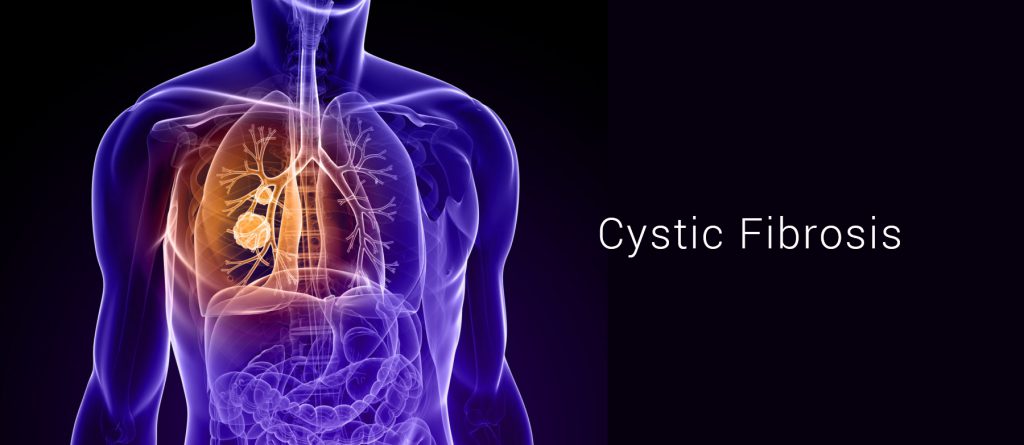CYSTIC FIBROSIS- MOLECULAR DIAGNOSIS & GENETIC COUNSELLING

Cystic Fibrosis (CF) is a multisystem inherited genetic disorder in which due to mutation in cystic fibrosis trans-membrane conductance regulator (CFTR) gene which affects the CFTR protein both quantitatively & qualitatively. It is a progressive and life threatening condition. The mutation disrupts the function of the chloride channels resulting in production of abnormally thick & sticky mucus which affects the affects epithelia of the respiratory tract, exocrine pancreas, intestine, hepatobiliary system, male genital tract, and exocrine sweat glands, resulting in complex multi-organ disease. The prevalence of cystic fibrosis in India is 1 in 10,000 but different studies suggest that annually 3000 children are born with this disease, raising an alarm of concern.
In India, people have lack of awareness about this condition. In India, many children lose their life due to chronic lung disease, recurrent pneumonia and severe malnutrition. It is really important to identify the symptom and make a definitive diagnosis which can help in managing the condition.
PRESENTATION
This condition is usually presented from early infancy but in 15% of cases, it can be presented during adulthood as well. Babies affected with CF may show mild symptoms at first which progresses as they age.
Some are born with a condition called meconium ileus, in which the meconium is too thick & sticky to pass through the rectum & can block the intestines. Ultrasound scan during pregnancy can show echogenic bowel and Jejunoileal atresia which can be due to abnormal meconium. Other presentation includes recurrent bronchiolitis in infancy and early childhood, chronic wheeze and air trapping, recurrent lower respiratory tract infections, chronic lung disease, bronchiectasis, failure to thrive and steatorrhea (presence of excess fat in feces). In older patients pancreatitis or male infertility due to azoospermia may be the presenting features. In male adult patients with CF, Congenital absence of the vas deferens (CAVD) is usually identified during investigation of infertility.
Pancreatic insufficiency and is another most common symptom of CF. Children affected with CF has inability to digest nutrients as thick mucus present in the lining of pancreas do not allow pancreatic juices to enter intestine and perform absorption. Despite of having optimal intake of nutrients, children with CF may be malnourished and fails to thrive.
Since CF affects the epithelial cells (present in the lining of organs), sweat glands are also affected in CF .Kids with CF have salty frosting in their skin and lose abnormally large amounts of salt when they sweat. Elevated immunoreactive trypsinogen during newborn screening can also be a presentation of CF.
IS CYSTIC FIBROSIS HEREDITARY?
Cystic Fibrosis is a hereditary condition & is usually inherited in an Autosomal Recessive manner. It means that two copies of mutated genes, inherited from each parent, leads to manifestation of disease. People with one copy of mutated gene are usually carriers and do not exhibit symptom of disease.
At conception, each sibling of an affected individual with CF and brothers of a male with CAVD have a 25% chance of being affected, a 50% chance of being an asymptomatic carrier, and a 25% chance of being unaffected and not a carrier.

DIAGNOSIS OF CYSTIC FIBROSIS
The standard diagnostic test of Cystic Fibrosis is called Sweat Test which helps in measuring the amount of salt in the sweat. Sometimes repeat test is required to establish the diagnosis. Child exhibiting established symptoms of the disease such as chronic cough, recurrent pneumonia, obstructive lung disease, and gastrointestinal/nutritional abnormalities such as meconium ileus, recurrent pancreatitis etc. are usually suspected for Cystic Fibrosis. Elevated immunoreactive trypsinogen (IRT) on newborn screening also raises suspicions of CF. Other standard methods include chest x-rays, blood test to detect nutritional status, bacterial studies to confirm the presence of bacterial infection common in CF and Pulmonary Function Test.
Molecular Diagnosis of Cystic Fibrosis:
Identification of mutation through genetic testing either through panel testing, single gene testing and deletion/duplication testing of CFTR gene usually establishes the diagnosis of CF.
Individual with strong family history can go for carrier screening. Couple with known carrier status can go for prenatal diagnosis of CFTR mutation during their pregnancy to know the mutation status in the fetus. Usually sequencing of CFTR gene followed by deletion-duplication analysis is initial diagnostic for fetus with high risk of CF, asymptomatic infant with meconium ileus, abnormal ultrasonography scan indicative of CF, infant with elevated IRT assay on newborn screening and borderline sweat chloride result.
Molecular diagnosis can confirm the gene mutation but can’t predict the severity of disease i.e. whether child will have mild or severe symptoms.
TREATMENTOF CYSTIC FIBROSIS
There is no absolute cure for cystic fibrosis but the condition can be managed depending upon the stage, symptoms and severity. Usually, the treatment is focused towards reducing the thickness and amount of mucus in the airways, preventing infections, preventing blockage of the intestines, ensuring the adequate intake of vitamins and nutrients & prevention of infections.
The universal management of a child with cystic fibrosis includes pancreatic enzyme replacement, supplementation of fat soluble vitamins, salt supplementation, airway clearance, antibiotics and supportive care with help of a multi-disciplinary team consisting of physician, physiotherapist, dietician, microbiologist and counselors.
In India, there are several obstacles starting from lack of awareness about the disease, lack of healthcare facilities, limited resources, and affordability of people (cost constraints). Although, genetic testing and genetic counseling facilities are steadily growing, people are still unaware about it.
SCREENING, DIAGNOSIS & GENETIC COUNSELLING FOR CYSTIC FIBROSIS WITH GENES2ME
Genes2Me provides screening of Cystic Fibrosis in highly multiplexed panel for screening clinically significant 72 common mutations in the CFTR gene. It can be performed during second trimester in high risk fetus for CF and also in patients with positive sweat test results, infant or child presenting with symptoms like diarrhea, malnutrition, poor growth, and weight loss.
Also, CFTR Gene Sequencing helps in complete analysis of CFTR gene. Genetic Counseling session are offered before opting for the test and after getting the result so that information related to the disease and genetic testing results could be properly conveyed to the individuals.
To know more about the test you can visit www.genes2me.com or contact Genes2Me.
